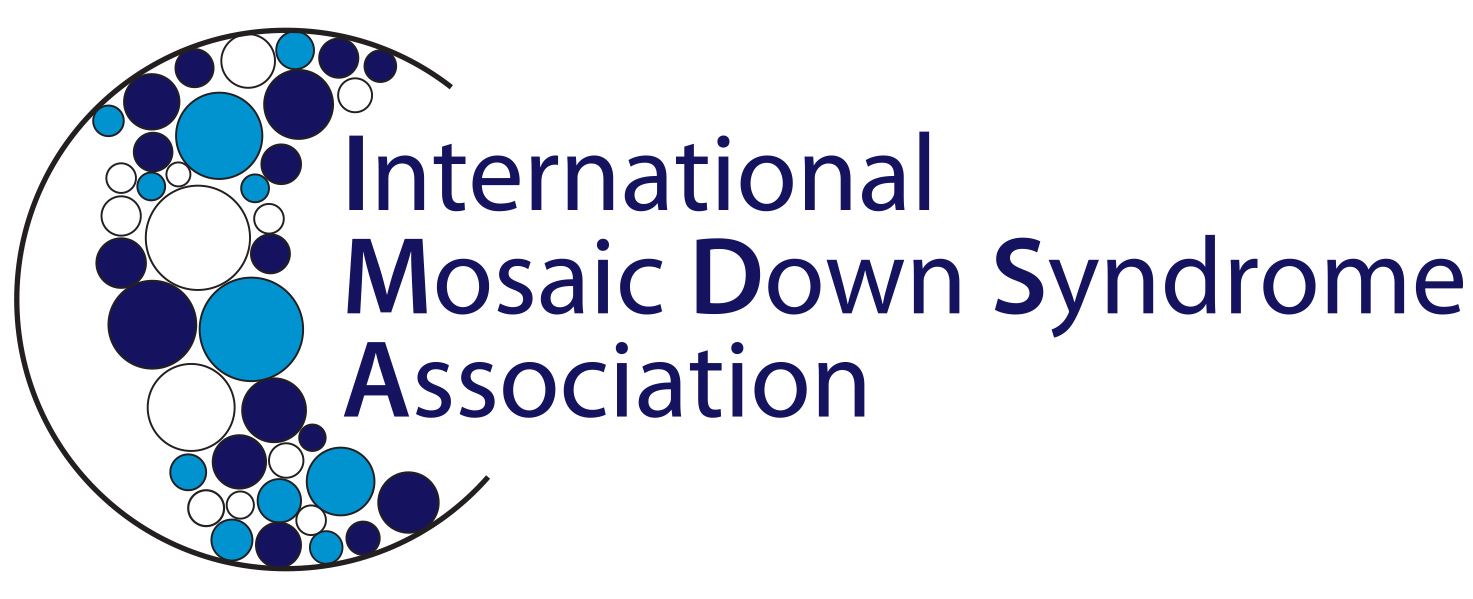Mosaic Down syndrome
by Dr.Len Leshin, MD, FAAP
What is Mosaicism?
Every cell in the human body comes from one initial cell: the fertilized egg, which is also called the zygote . After fertilization, the zygote then proceeds to divide.
As new cells form, the chromosomes duplicate themselves so that the resulting cells have the same number of chromosomes as the original cell. However, mistakes sometimes happen and one cell ends up with a different number of chromosomes. From then on, all cells originating from that cell will have the different chromosomal number, unless another mistake happens. (All like cells originating from a single type of cell is called a cell line ; for example, the skin cell line, the blood cell line, the brain cell line, etc.)
When a person has more than one type of chromosomal makeup, that is called mosaicism , like the mosaic style of art in which a picture is made up of different colors of tiles. In Down syndrome, mosaicism means that some cells of the body have trisomy 21, and some have the typical number of chromosomes.
How is Mosaicism Diagnosed?
The usual way in which mosaic Down syndrome is discovered is through genetic testing of the baby's blood. Typically, 20 to 25 cells are examined. If some of the cells have trisomy 21 and some don't, then the diagnosis of mosaicism is made.
However, this blood test can only determine the level of mosaicism in the blood cell line.
While mosaicism can occur in just one cell line (some blood cells have trisomy 21 and the rest don't), it can also occur across cell lines (skin cells may have trisomy 21 while other cell lines don't). In the latter case, it may be more difficult to diagnose mosaicism. When mosaicism is suspected but not confirmed through the blood test, other cell types may be tested: skin and bone marrow are most commonly the next cells checked. Because skin cells and brain cells arise from the same type of cell at the beginning of fetal development (ectoderm), many doctors believe that skin cell tests reflect the chromosomal makeup of the brain cells as well.
How Does Mosaicism Happen in Down Syndrome?
There are two different ways mosaicism can occur:
The initial zygote had three 21st chromosomes, which normally would result in simple trisomy 21, but during the course of cell division one or more cell lines lost one of the 21st chromosomes.
The initial zygote had two 21st chromosomes, but during the course of cell division one of the 21st chromosomes were duplicated.
It's possible to determine the origin of mosaicism in individual cases using special DNA markers, but this isn't done on a regular basis.
What Does Mosaicism Mean for my Child?
At the present time, there is not much research on the similarities and differences between simple trisomy 21 and mosaic trisomy 21. One report published in 1991 on mental development in Down syndrome mosaicism compared 30 children with mosaic Down syndrome with 30 children with typical Down syndrome. IQ testing showed that the mean IQ of the mosaic group was 12 points higher than the mean of the non-mosaic group. However, some children with typical Down syndrome did score higher on the IQ tests than some of the children with mosaic Down syndrome.
The Department of Human Genetics at the Medical College of Virginia has had an ongoing study project of children with mosaic DS. In a survey of 45 children with mosaicism, they found that these children did show delayed development compared to their siblings. When 28 of these children with mosaicism were matched up with 28 children with typical Down syndrome for age and gender, the children with mosaicism reached certain motor milestones earlier than children with typical DS, such as crawling and walking alone. However, the speech development was equally delayed in both groups.

Resources
The Department of Human Genetics at the Medical College of Virginia/Virginia Commonwealth University has a very nice booklet on this topic that is available free of charge. Contact Dr. Colleen Jackson-Cook or Lauren Vanner at:
Dept of Human Genetics ~ Virginia Commonwealth University ~ PO Box 980033 ~ Richmond ~ VA 23298-0033
References
1. Understanding the mechanism(s) of mosaic trisomy 21, by using DNA polymorphism analysis. Pangalos C et al. Am. J. Hum. Genet. 54:473-481, 1994.
2. Mental Development in Down Syndrome Mosaicism. Fishler K and Koch R. Am. J. Mental Retardation 96(3):345-351, 1991.
3. Medical Care in Down Syndrome , Rogers PT and Coleman M, Marcel Dekker, NY, 1992; p14-16.
Would you like a pdf version of this for printing mDs by Dr Len Leshin.pdf